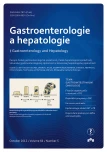Diagnosis and therapy of celiac disease: today and tomorrow
Authors:
M. Bátovský
Authors‘ workplace:
Gastroenterologická klinika SZU a UNB, UN sv. Cyrila a Metoda, Bratislava
Published in:
Gastroent Hepatol 2012; 66(5): 372-376
Category:
Clinical and Experimental Gastroenterology: Review Article
Overview
Increased knowledge of non-invasive markers of celiac disease activity will hopefully enable better initial diagnosis and monitoring of intestinal damage (serological markers, galectin-10, cytokines). Additional celiac disease activity markers are being identified and new targets for treatment are being considered (P31–43 peptide, zonulin). Several new therapeutic approaches for celiac disease are currently under development by targeting its underlying pathogenesis. Alternative therapies range from reproduction of harmless wheat strains to immunomodulatory approaches. Some of these therapies, such as enzymatic cleavage of gluten and permeability inhibitors, have shown promise in clinical studies. Currently, adherence to a gluten-free diet is considered as the first line and indeed only therapy for celiac disease which has been proven to relieve symptoms in most cases and effectively prevent potential complications.
Key words:
celiac disease – gluten enteropathy – gluten-free diet – malabsorption syndrome
The author declares he has no potential conflicts of interest concerning drugs, products, or services used in the study.
The Editorial Board declares that the manuscript met the ICMJE „uniform requirements“ for biomedical papers.
Submitted:
4. 6. 2012
Accepted:
17. 7. 2012
Sources
1. Rashtak S, Murray JA. Coeliac disease, new approaches to therapy. Aliment Pharmacol Ther 2012; 35(7): 768–781.
2. AGA institute medical position statement on the diagnosis and management of celiac disease. Gastroenterology 2006; 131(6): 1977–1980.
3. Armstrong MJ, Hegade VS, Robbins G. Advances in celiac disease. Curr Opin Gastroenterol 2012; 28(2): 104–112.
4. Moore JK, West SRA, Robbins G. Advances in celiac disease. Curr Opin Gastroenterol 2011; 27(2): 112–118.
5. Vivas S, de Morales J. Duodenal biopsy may be avoided when high transglutaminase antibody titers are present. World J Gastroenterol 2009; 15(38): 4775–4780.
6. Zandonadi RP, Botelho RB, Araujo WM. Psyllium as a substitute for gluten in bread. J Am Diet Assoc 2009; 109(10): 1781–1784.
7. Watts RE, Siegel M, Khosla C. Structure-acitivity relationship analysis of the selective inhibition of transglutaminase 2 by dihidroisoxazoles. J Med Chem 2006; 49(25): 7493–7501.
8. Tripathi A, Lammers KM, Goldblum S. Identification of human zonulin, a physiological modulator of tight junctions, as prehaptoglobin-2. PNAS 2009; 106(39): 16799–16804.
9. Keech CL, Dromey J, Chen ZJ. Immune tolerance induced by peptide immunotherapy in an HLA DQ2 dependent mouse model of gluten imunity. Gastroenterology 2009; 136: A57.
10. Constantino G, de la Torre A, Lo Presti MA. Treatment of lifethreatening type I refractory coeliac disease with long term infliximab. Dig Liver Dis 2008; 40(1): 74–77.
11. Malamut G, El Machhour R, Montcuquet N. IL-15 trigger an antiapoptotic pathway in human intraepithelial lymphocytes that is a potential new target in celiac disease associated inflammation and lymphomagenesis. J Clin Invest 2010; 120(6): 2131–2143.
Labels
Paediatric gastroenterology Gastroenterology and hepatology SurgeryArticle was published in
Gastroenterology and Hepatology

2012 Issue 5
- Possibilities of Using Metamizole in the Treatment of Acute Primary Headaches
- Metamizole at a Glance and in Practice – Effective Non-Opioid Analgesic for All Ages
- Metamizole vs. Tramadol in Postoperative Analgesia
- Spasmolytic Effect of Metamizole
- The Importance of Limosilactobacillus reuteri in Administration to Diabetics with Gingivitis
-
All articles in this issue
- Gastrointestinal oncology – near future reality?
- Epidemiology of malignant tumours of the gastrointestinal tract in the Czech Republic – state of the art and prediction
- Reflection on the financial aspects of caring for patients with colorectal carcinoma
- National Colorectal Cancer Screening Program in the Czech Republic – past, presence and future
- Pancreatic cancer
- Endoscopic ablative therapy of the proctosigmoideal neoplastic lesions – a pilot study
- Oesophageal cancer and risk factors by histological type
- Diagnosis and therapy of celiac disease: today and tomorrow
- Non-alcoholic steatohepatitis (NASH) – every physician's concern
- Endoscopy in patients with anticoagulant and antiplatelet therapy
- Guidelines for the administration of aminosalicylatesin patients with inflammatory bowel diseases
- How to improve colorectal cancer screening?
- XXI. Spring Meeting in Loket – advances in the treatment of patients with carcinoma of the pancreas
- Prague Hepatology Meeting 2012
- Prof. MUDr. Aleš Hep, CSc., turned 60
- Budenofalk 2 mg rectal foam represents a major new option in the treatment of patients with ulcerous colitis
- Gastroenterology and Hepatology
- Journal archive
- Current issue
- About the journal
Most read in this issue
- Budenofalk 2 mg rectal foam represents a major new option in the treatment of patients with ulcerous colitis
- Epidemiology of malignant tumours of the gastrointestinal tract in the Czech Republic – state of the art and prediction
- Pancreatic cancer
- Prof. MUDr. Aleš Hep, CSc., turned 60
